From startups offering niche tools to global enterprises selling full-stack security, the cybersecurity market is crowded and growing. Gartner predicts global spending on cybersecurity will hit $215 billion in 2025, meaning competition for visibility is only going to intensify. Cybersecurity SEO ensures your brand cuts through the noise, ranks for high-intent searches, and is positioned as a trusted authority in both Google results and AI-generated answers.
What Is Cybersecurity SEO?
Cybersecurity SEO is the process of optimizing a security company’s website so it ranks higher for relevant search queries—from “penetration testing services” to “best SOC-as-a-service providers.”
In simple terms, it means understanding how search engines evaluate websites and applying strategies that help cybersecurity firms earn top positions on the search engine results page (SERP).
The goal is clear: drive qualified traffic, generate leads, and ultimately grow revenue.
How Cybersecurity SEO Is Different From General SEO
Unlike generic SEO, cybersecurity SEO demands a much higher standard of credibility and precision:
- Higher trust signals: In a field where credibility is everything, one error can cost you a client.
- Technical accuracy: Content must be vetted, often with client or subject-matter input to ensure it’s correct and compliant..
- Faster refresh cycles: Security threats evolve rapidly, making outdated content risky.
- AI discoverability: SEO today goes beyond Google. AI-driven systems like ChatGPT, Perplexity, and Gemini now curate answers, so structuring content for Generative Engine Optimization (GEO) is essential.
| 📊 Cybersecurity is one of the most competitive sectors, with CPCs for keywords like “cybersecurity services” averaging $138.57 per click. That makes SEO a cost-effective way to lower acquisition costs. |
SEO Best Practices for Cybersecurity Companies and Services
Google’s search algorithms consider many factors when ranking pages, including the words in your query, expertise of sources, relevance of pages, and individual search settings.
For cybersecurity brands, demonstrating authority, trustworthiness, and clear information is crucial for both users and search engines.
Understanding the fundamentals of cybersecurity SEO can help you optimize your site effectively, improve visibility, and attract the right audience.
1. Check Your Website’s Technical SEO Health
While Google generally discovers and indexes websites automatically, some sites can be overlooked. Verifying that your site appears in Google Search and taking steps to optimize its visibility ensures your content reaches the right audience.
Here are a few key areas to focus on when auditing your cybersecurity website:
- Secure hosting, SSL/TLS, and HTTPS are essential. Even a single “Not Secure” warning can increase bounce rates by 84%.
- Address crawlability, duplicate content, and Core Web Vitals issues. Google has confirmed that site speed and user experience directly impact rankings.
- Ensure your domain is free from malware or phishing tags. In the cybersecurity space, your website itself is your reputation.
Here’s what John Mueller, Google’s Senior Webmaster Trends Analyst, has to say about Technical SEO.
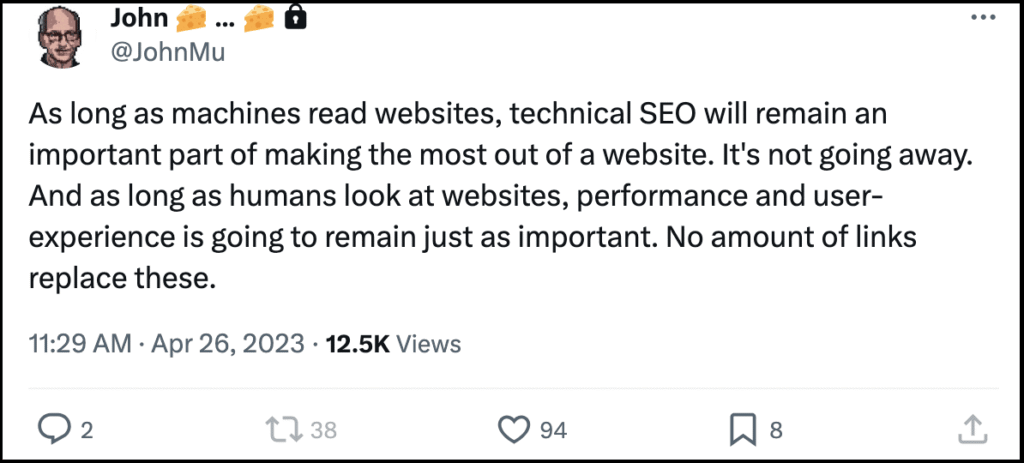
2. Build Keyword Clusters Around Core Security Topics
In the early days of SEO, repeating the same keyword across a page could actually boost rankings. But Google’s algorithm has evolved. It now understands the meaning and context behind words, not just the exact match terms.
That’s where keyword clustering comes in. By grouping related search terms like “cloud security services,” “cloud data protection,” and “cloud compliance solutions,” you can build topical authority around an entire theme rather than targeting a single phrase.
For example, Check Point Software has built a strong content ecosystem around cloud security. It covers everything from cloud security best practices and trends to solutions and compliance.
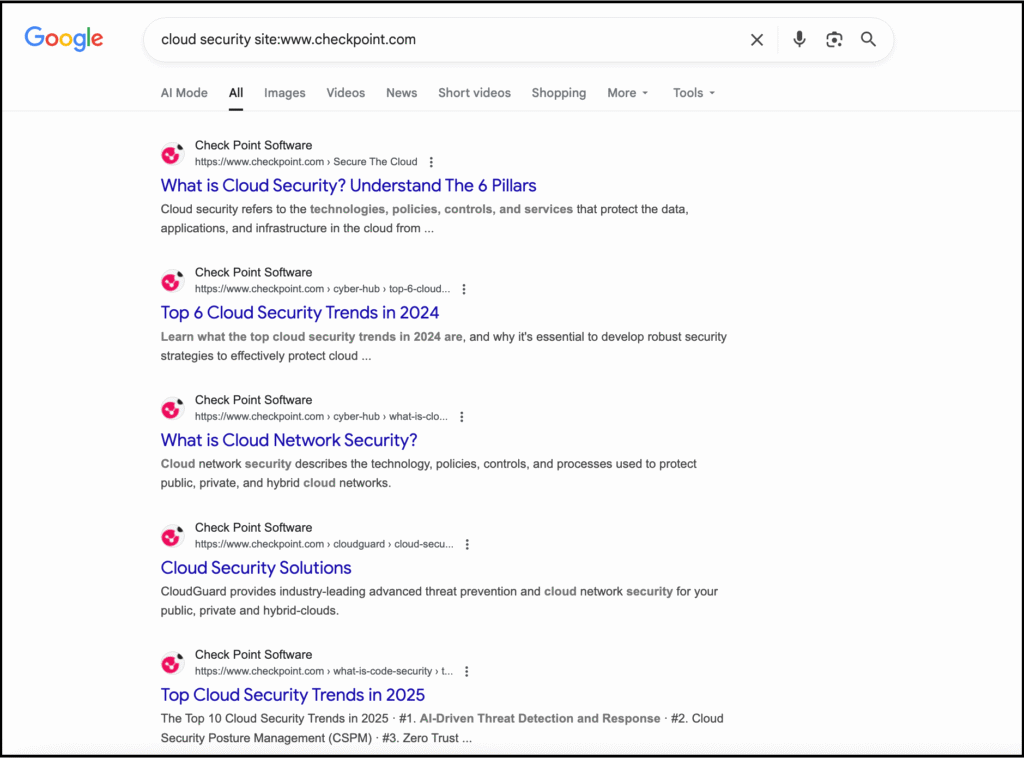
This kind of content clustering helps the brand appear for multiple related searches and reinforces its authority in the space.
Beyond SEO, clustering also strengthens AI visibility. Large language models (LLMs) like ChatGPT tend to associate brands with topics they consistently cover in depth.
When I searched for “best cloud security service provider” in ChatGPT, Check Point appeared instantly. It’s proof that semantic authority now matters as much as keyword ranking.
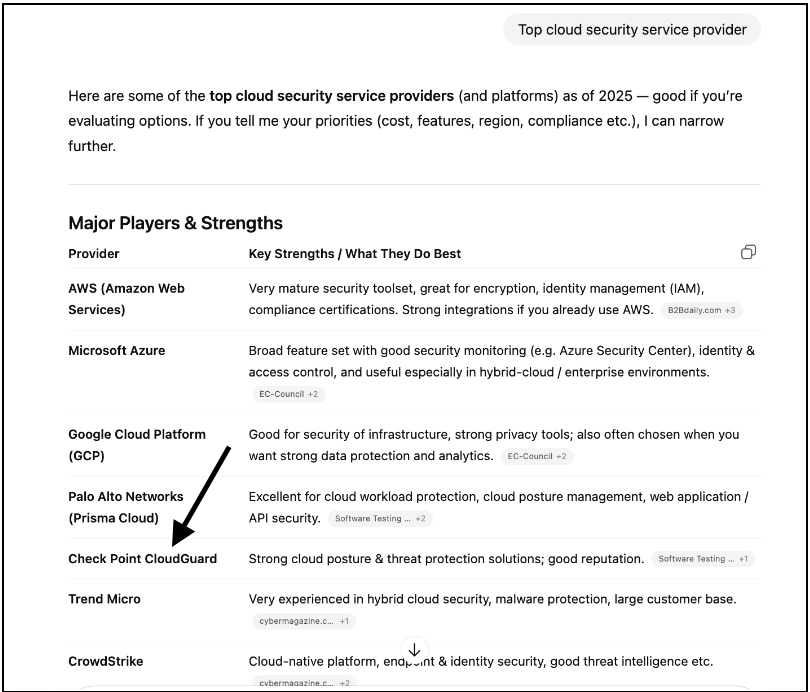
Google makes it easy to find related terms for your content. Tools like Google Autocomplete and the People Also Ask section reveal real search patterns and help you anticipate variations in how users might phrase their queries.
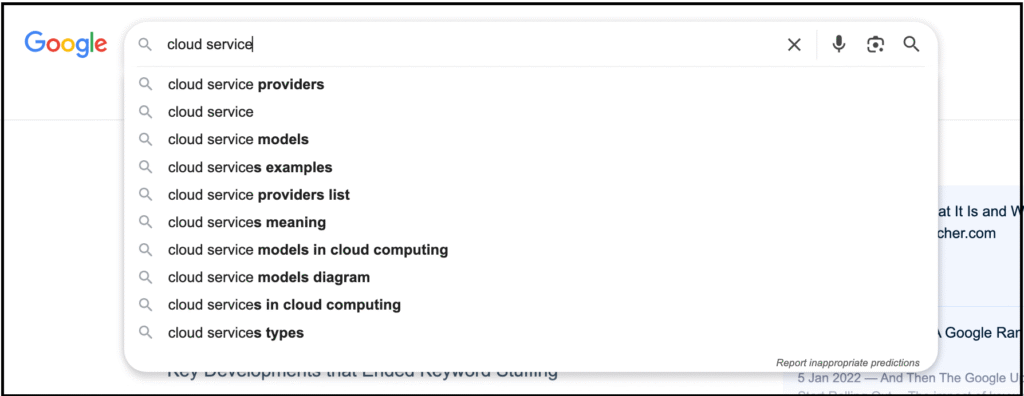
You can then use tools like Semrush or Google Keyword Planner to find out which keywords have high search volume, low competition, or strong commercial intent. This helps you prioritize the terms that will drive meaningful traffic and leads.
3. Create Content That Builds Trust and Authority
High-quality content in cybersecurity is crucial for establishing authority, building trust, and demonstrating expertise.
Google emphasizes people-first content created primarily for readers rather than to manipulate search rankings. Applying these same principles also boosts your chances of being recognized and referenced by AI systems like ChatGPT, Perplexity, and Google AI Overviews.
Here’s how to create content that performs well across both search and AI discovery:
- Publish a mix of evergreen guides (e.g., “What is Zero Trust Security?”) and timely updates (e.g., “New SEC Cybersecurity Disclosure Rules 2025”) to keep your content relevant and authoritative.
- Structure your content with clear headings, lists, and FAQs to increase the likelihood of being featured in Google snippets and AI-generated answers.
- Use data and expert insights: 45% of B2B buyers trust content more when it’s backed by statistics or expert validation. For instance, updating a 2023 blog on “Phishing Attacks” with the latest FBI Internet Crime Report data can strengthen both search rankings and AI relevance.
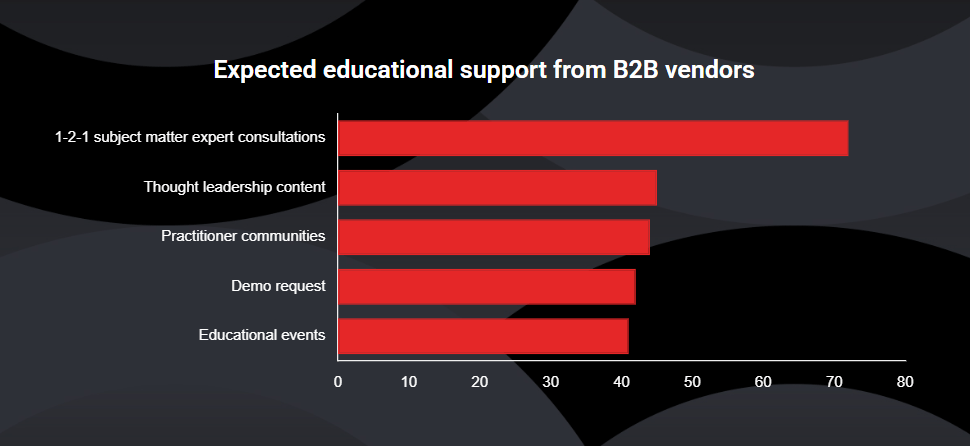
Using E-E-A-T to strengthen content credibility
Evaluating content with Google’s E-E-A-T framework—experience, expertise, authoritativeness, and trustworthiness—helps maintain credibility and SEO performance.
One practical approach is to assess content using Who, How, and Why:
- Who: Who is creating the content, and what expertise do they bring?
- How: How is the information presented—clear, structured, and verifiable?
- Why: Why should users trust and engage with this content?
Cybersecurity buyers are cautious and research-driven; your content strategy should reassure them of your credibility, technical expertise, and ability to safeguard their organization.
4. Build High-Quality Backlinks for Authority
In cybersecurity, where trust and credibility drive every purchase decision, backlinks act as digital endorsements that signal authority to both Google and your buyers.
Building high-quality links from reputable sources helps strengthen your domain authority and brand visibility across competitive search results.
Let’s look at the four most effective backlink types that cybersecurity brands use to build lasting authority.
i. Review site backlinks (directories)
Before investing in cybersecurity solutions, buyers often validate brands by reading third-party reviews. That’s why it’s crucial to have your business listed on trusted review and directory platforms such as G2, Clutch, and Software Advice.
Here’s an example of how Check Point Software has created backlinks through various review platforms. It helps them appear where potential buyers are actively researching solutions.
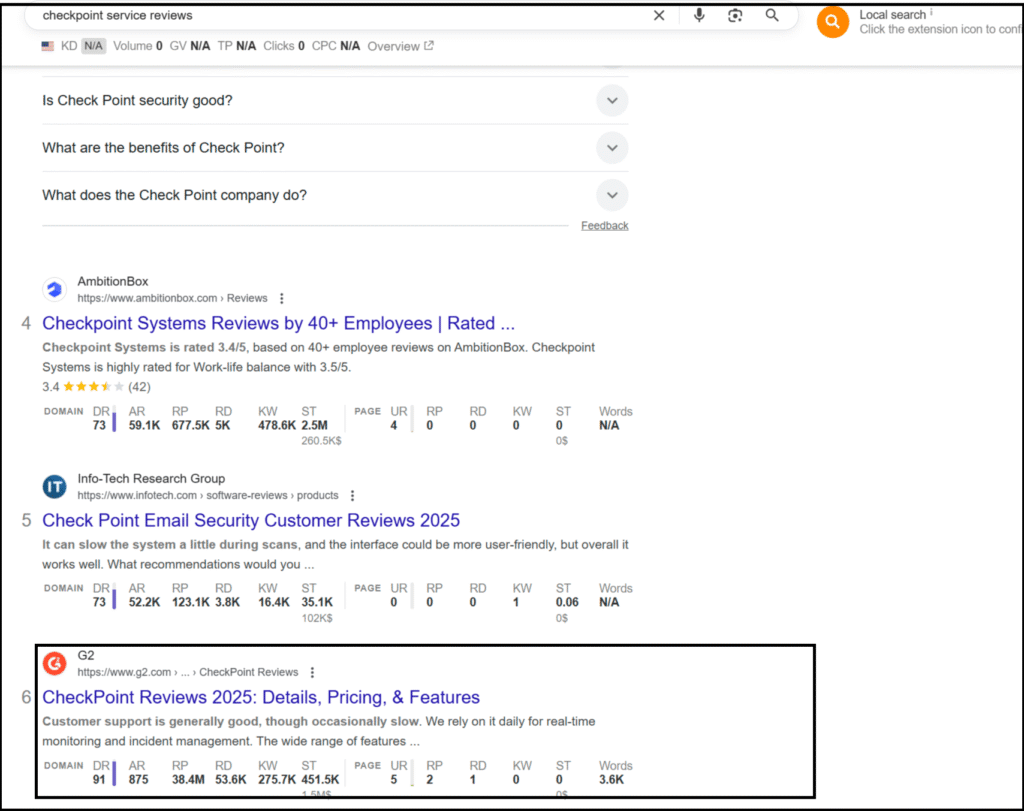
Create complete profiles with your website link and encourage satisfied clients to share genuine reviews. These listings not only improve visibility but also build trust signals that influence both search rankings and buyer perception.
ii. Listicle backlinks
Listicles like “Top 10 Cloud Security Companies” or “Best SOC-as-a-Service Providers” attract high-intent traffic and serve as a powerful credibility builder.
Being featured in these articles, especially on reputable publications or blogs, positions your brand alongside industry leaders and drives qualified referral traffic.
Check Point Software has earned backlinks across multiple listicle sites, increasing both brand awareness and search authority.
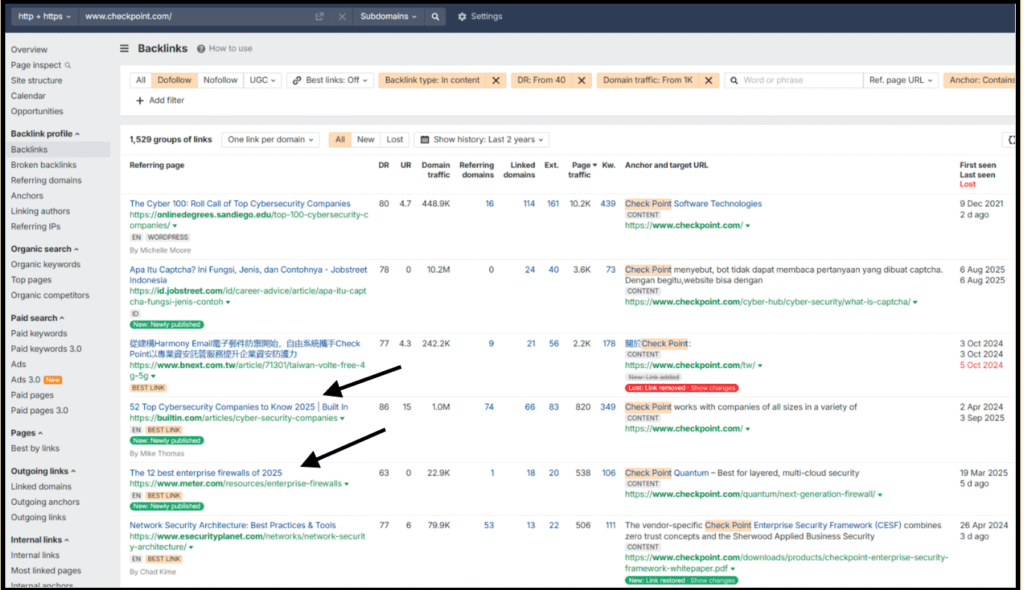
You can secure such placements through digital public relations (PR) outreach, partnerships, or by publishing your own curated industry lists that include your brand and other credible players.
iii. Brand mentions
Brand mentions indicate that your company is being talked about across trusted sources.
And with a little effort, you can turn unlinked brand mentions into high-authority backlinks that directly strengthen your SEO performance. Unlinked brand mentions are when a site references your company without adding a hyperlink.
Here’s an example of how Check Point Software has earned numerous brand mentions across websites with domain ratings above 40.
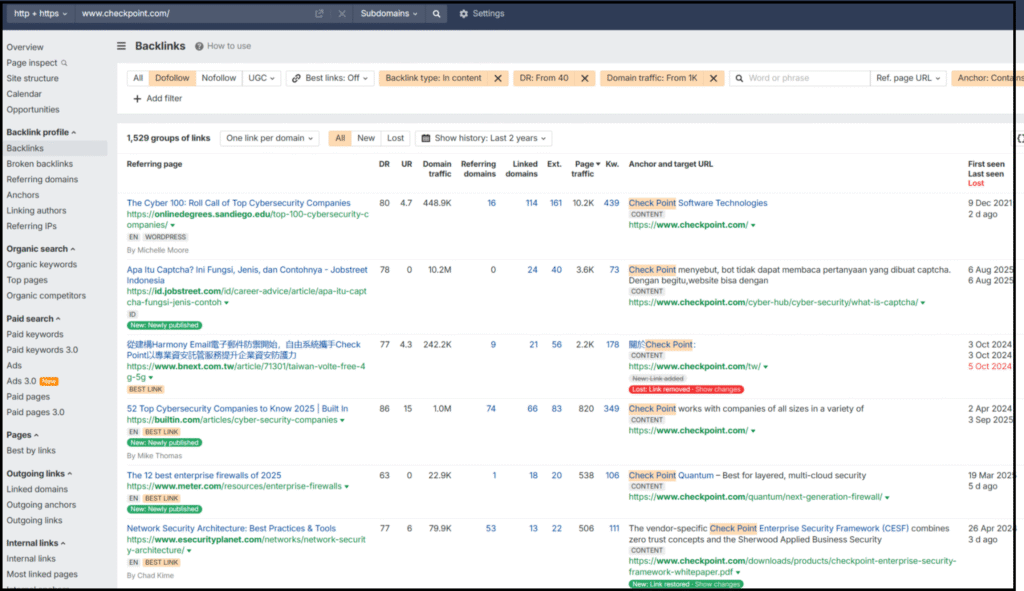
Use tools like Google Alerts or Ahrefs Content Explorer to track where your brand is mentioned online. Then, reach out to publishers with a short, value-driven request to add your website link for reader context. It’s a simple yet powerful way to reclaim authority from content that already exists.
You can also generate new brand mentions by contributing to expert roundups, sharing insights in cybersecurity reports, or being quoted in credible news outlets.
Over time, consistent mentions strengthen your brand’s visibility and trustworthiness within the cybersecurity ecosystem.
iv. Contextual backlinks (in-content placements)
Contextual backlinks are links placed naturally within relevant content, such as blogs, guides, research articles, or whitepapers, that relate directly to your niche. In cybersecurity, this could mean earning a link from an article about Zero Trust Architecture, cloud security best practices, or threat intelligence solutions.
At Check Point Software, you can see how their contextual link building revolves around high-intent keywords like VPN, secure your business, network security, and firewall as a service.
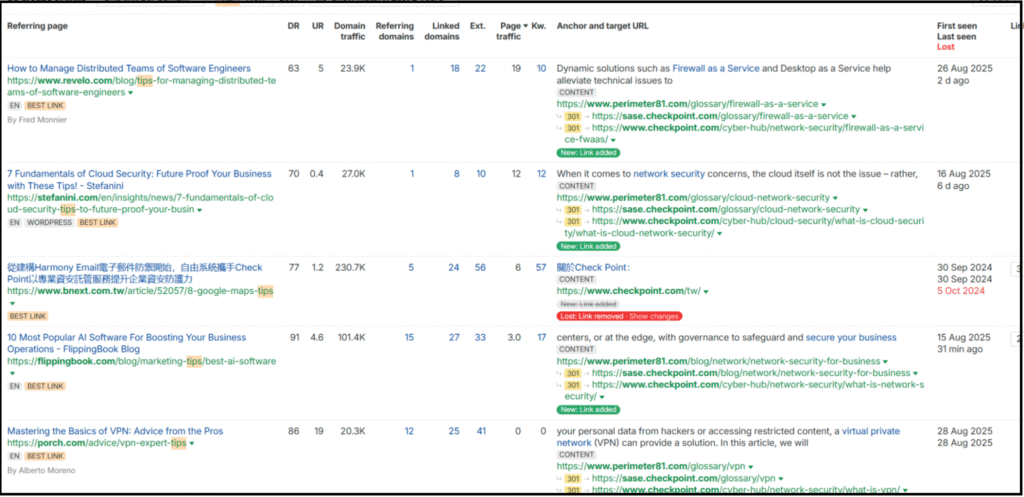
These placements appear naturally within authoritative articles, reinforcing their expertise across multiple cybersecurity themes.
Contextual backlinks are highly valuable because they blend seamlessly into the content, offering genuine value to both readers and search engines.
Besides, they deliver long-term SEO value—editorial links often stay live for years, continuing to pass authority.
At Tanot Solutions, we specialize in creating a backlink ecosystem that balances all four: listicle placements, trusted directory listings, brand mentions, and contextual links.
Our team carefully selects placements that align with your keyword strategy, brand authority, and target audience. Every backlink is vetted, approved by you, and designed to deliver measurable results in rankings, traffic, and ROI.
With 5,000+ backlinks delivered for 150+ global brands, Tanot specializes in building high-authority, traffic-driving links that strengthen equity over time.
5. Monitor and Improve SEO Performance Over Time
Building authority is only half the game. The real results come from tracking how your efforts perform over time.
Regularly monitoring your SEO metrics helps you understand what’s working, what needs refinement, and where to double down.
Focus on key performance indicators (KPIs) such as:
- Keyword rankings: Are your priority keywords improving in visibility?
- Organic traffic: Is your content attracting more qualified visitors month over month?
- AI visibility: Are your pages or brand being cited in AI-generated summaries or overviews?
- Lead generation & conversion rates: Are those visits translating into demo requests, consultations, or sign-ups?
Use tools like Google Search Console, Ahrefs, Semrush, and AI-discovery trackers such as Authoritas to measure performance across search and emerging AI ecosystems.
These platforms provide actionable insights into keyword growth, backlink health, content visibility, and user behavior.
Adapt continuously to Google algorithm updates and AI model shifts—SEO is never static. What ranks well today may change tomorrow, so keeping a pulse on performance ensures you stay ahead of the curve.
Top Cybersecurity SEO Service Providers in 2026
If you’re ready to invest in SEO for your cybersecurity business, choosing a specialized agency can make all the difference.
Besides technical optimization, cybersecurity SEO requires precise messaging that builds trust and authority in a sensitive, high-stakes industry.
Here are three SEO service providers known for delivering results in this niche:
1. Tanot Solutions
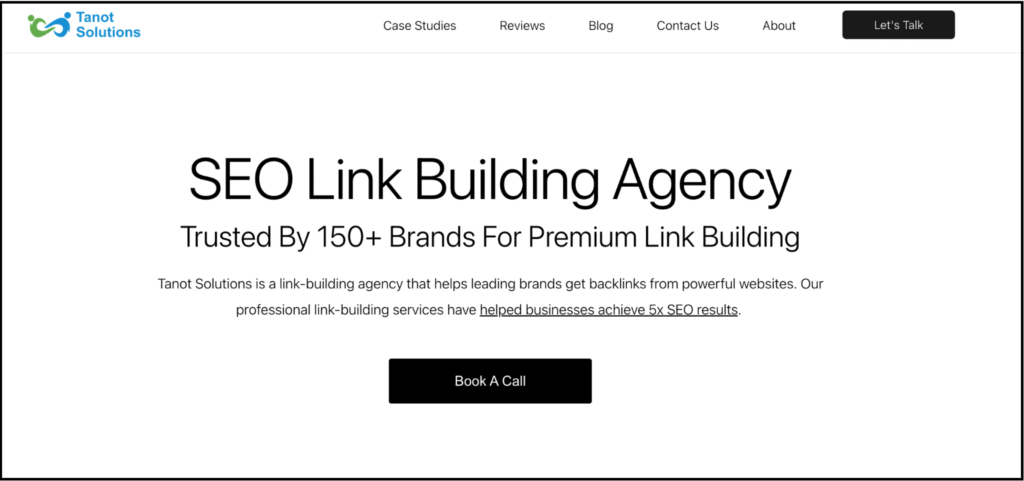
At Tanot Solutions, we focus on one thing—building links with trust and strategy. Unlike most agencies, we never outsource, rely on mediators, or purchase backlinks.
Every placement is secured through real editors and publisher relationships, ensuring authenticity and long-term value.
We also make content accuracy a top priority—each piece is reviewed with client approval to maintain credibility and technical precision.
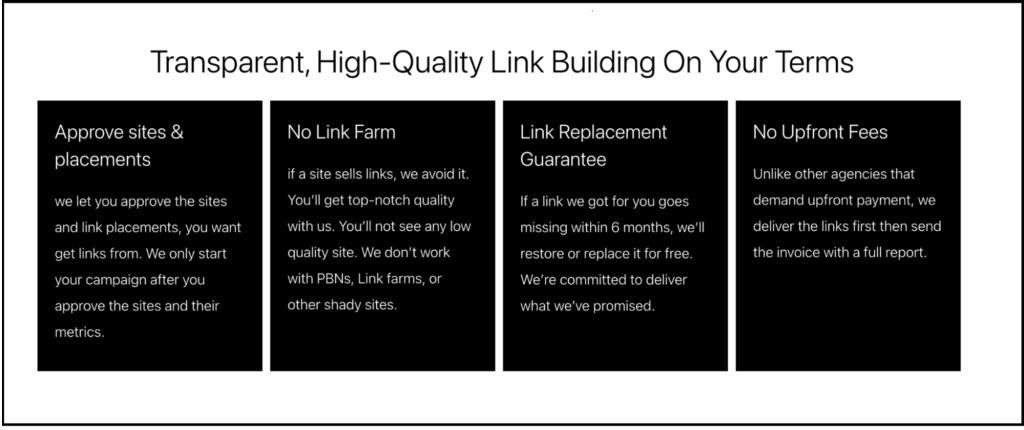
With complete in-house control over outreach, placement, and reporting, Tanot guarantees backlinks that are both credible and compliant with Google’s standards.
2. Hop Online
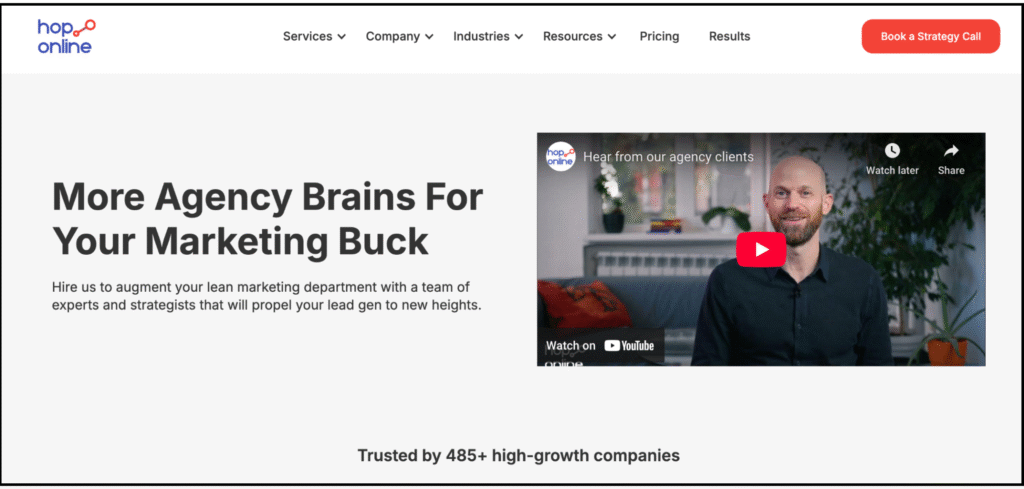
Hop Online is a performance marketing agency with expertise in SEO, PPC, and content marketing for B2B and cybersecurity brands. Their strength lies in full-funnel strategies that combine content, authority building, and lead generation.
3. Stratabeat
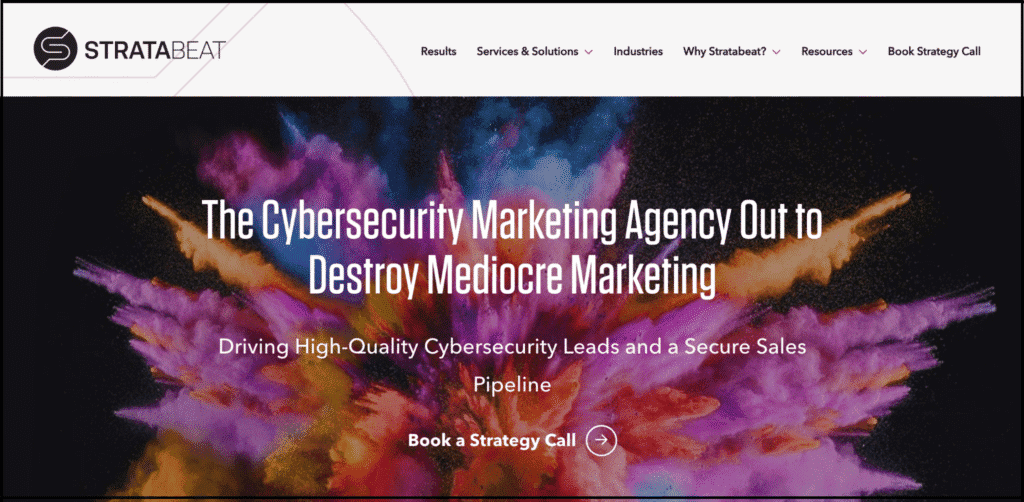
Stratabeat focuses on branding and marketing for cybersecurity and tech companies. Their approach blends storytelling with SEO, helping clients communicate complex solutions in a way that resonates with technical and executive audiences.
How to Choose the Right Cybersecurity SEO Partner
Before shortlisting SEO service providers, it’s essential to understand what drives the cost. Pricing in the cybersecurity SEO space can vary based on project scope, industry competitiveness, and the quality of execution.
Here’s a general breakdown of what you can expect to invest:
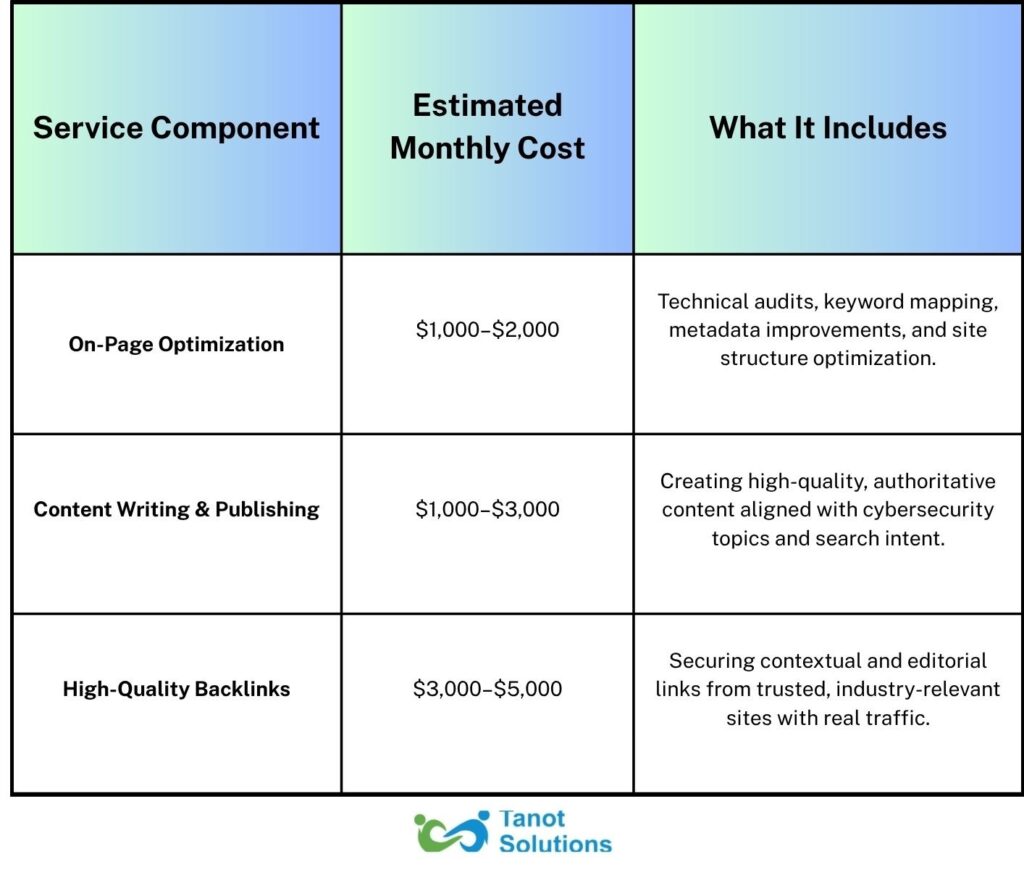
Overall, brands investing in cybersecurity SEO can expect to spend between $5,000 and $10,000 per month for a comprehensive, ROI-driven strategy.
Choosing the Right Cybersecurity SEO Partner
Finding the right SEO agency goes beyond comparing price tags. You need to choose a partner who also understands your industry, your audience, and your long-term growth goals.
Here are a few key traits to look for:
- Deep cybersecurity expertise: The agency should understand the technical language, regulatory nuances, and compliance-driven nature of the cybersecurity industry.
- White-hat, editorial link building: Look for partners who earn links through genuine publisher relationships, and not link farms or paid placements.
- Transparent reporting: Choose an agency that offers clear performance reports, metrics you can verify, and client-approved content at every stage.
- Sustainable growth mindset: Avoid providers who chase short-term ranking spikes; focus instead on those who build lasting domain authority.
Assessing potential partners using these criteria will help you identify agencies that deliver measurable SEO results while staying true to your brand’s credibility, values, and long-term vision.
Final Thoughts: Build Authority with a Partner You Can Trust
SEO in cybersecurity is all about building long-term credibility in a space where trust defines success. Whether you’re improving visibility, earning backlinks, or strengthening brand authority, the right SEO partner ensures every step contributes to measurable, lasting growth.
If you’re looking for a partner who understands both the stakes of cybersecurity and the nuances of SEO, look no further.
Tanot Solutions helps cybersecurity brands scale safely, sustainably, and strategically.
Take one step with Tanot Solutions towards strengthening your cybersecurity website equity. Contact us today.
Frequently Asked Questions (FAQs)
What is the best SEO strategy for cybersecurity companies?
The best SEO strategy combines technical optimization, high-authority backlinks, and content clustering around key cybersecurity topics. This includes building topical authority with targeted keyword groups (e.g., “cloud security,” “SOC services”) and regularly updating content to reflect current threats. AI optimization, such as structuring content for featured snippets and generative engines, is also critical in 2026.
How much does cybersecurity SEO cost in 2026?
In 2026, cybersecurity SEO services typically cost between $5,000 and $10,000 per month. Pricing depends on the level of competition, content requirements, backlink strategy, and scope of technical optimization. High-quality backlinks and expert-written content contribute significantly to total cost but also deliver long-term ROI.
How do I get my cybersecurity company to rank on Google?
To rank on Google, your cybersecurity site needs clean technical SEO, fast performance, secure hosting (HTTPS), relevant content built around keyword clusters, and backlinks from trusted industry sites. Including structured data, E-E-A-T (experience, expertise, authoritativeness, trust), and regular updates will improve visibility over time.
What keywords should cybersecurity companies target for SEO?
Cybersecurity companies should target keywords with high intent and relevance, such as “penetration testing services,” “SOC-as-a-service providers,” “cloud security solutions,” and “NIST compliance tools.” Grouping related terms into clusters helps build topical authority and increases visibility for multiple variations of a query.
Does SEO work better than paid ads for cybersecurity services?
SEO is more cost-effective long term, while paid ads deliver faster but more expensive results. With high CPCs in cybersecurity ($100+), SEO can drive qualified traffic at lower costs. A strong SEO strategy supports trust, AI visibility, and sustained lead generation, even when ad budgets fluctuate.
How can cybersecurity companies appear in AI-generated answers like ChatGPT?
To appear in AI results, cybersecurity firms should publish authoritative, structured content with clear topics and FAQs. Covering themes like Zero Trust, data protection, and compliance in depth builds semantic relevance. Using schema markup, citations, and regularly updated expert content increases visibility in AI tools like ChatGPT and Google’s AI Overviews.



